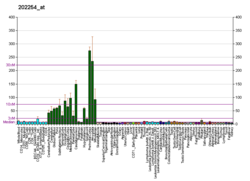SIPA1L1
Appearance
(Redirected from SIPA1L1 (gene))
Signal-induced proliferation-associated 1-like protein 1 is a protein that in humans is encoded by the SIPA1L1 gene.[5][6]
References
[edit]- ^ a b c GRCh38: Ensembl release 89: ENSG00000197555 – Ensembl, May 2017
- ^ a b c GRCm38: Ensembl release 89: ENSMUSG00000042700 – Ensembl, May 2017
- ^ "Human PubMed Reference:". National Center for Biotechnology Information, U.S. National Library of Medicine.
- ^ "Mouse PubMed Reference:". National Center for Biotechnology Information, U.S. National Library of Medicine.
- ^ Gao Q, Srinivasan S, Boyer SN, Wazer DE, Band V (January 1999). "The E6 oncoproteins of high-risk papillomaviruses bind to a novel putative GAP protein, E6TP1, and target it for degradation". Molecular and Cellular Biology. 19 (1): 733–44. doi:10.1128/mcb.19.1.733. PMC 83930. PMID 9858596.
- ^ "Entrez Gene: SIPA1L1 signal-induced proliferation-associated 1 like 1".
Further reading
[edit]- Nakajima D, Okazaki N, Yamakawa H, Kikuno R, Ohara O, Nagase T (June 2002). "Construction of expression-ready cDNA clones for KIAA genes: manual curation of 330 KIAA cDNA clones". DNA Research. 9 (3): 99–106. CiteSeerX 10.1.1.500.923. doi:10.1093/dnares/9.3.99. PMID 12168954.
- Olsen JV, Blagoev B, Gnad F, Macek B, Kumar C, Mortensen P, Mann M (November 2006). "Global, in vivo, and site-specific phosphorylation dynamics in signaling networks". Cell. 127 (3): 635–48. doi:10.1016/j.cell.2006.09.026. PMID 17081983.
- Lee C, Wooldridge TR, Laimins LA (February 2007). "Analysis of the roles of E6 binding to E6TP1 and nuclear localization in the human papillomavirus type 31 life cycle". Virology. 358 (1): 201–10. doi:10.1016/j.virol.2006.08.028. PMID 16999984.
- Benzinger A, Muster N, Koch HB, Yates JR, Hermeking H (June 2005). "Targeted proteomic analysis of 14-3-3 sigma, a p53 effector commonly silenced in cancer". Molecular & Cellular Proteomics. 4 (6): 785–95. doi:10.1074/mcp.M500021-MCP200. PMID 15778465.
- Chih DY, Park DJ, Gross M, Idos G, Vuong PT, Hirama T, Chumakov AM, Said J, Koeffler HP (December 2004). "Protein partners of C/EBPepsilon". Experimental Hematology. 32 (12): 1173–81. doi:10.1016/j.exphem.2004.08.014. PMID 15588942.
- Beausoleil SA, Jedrychowski M, Schwartz D, Elias JE, Villén J, Li J, Cohn MA, Cantley LC, Gygi SP (August 2004). "Large-scale characterization of HeLa cell nuclear phosphoproteins". Proceedings of the National Academy of Sciences of the United States of America. 101 (33): 12130–5. Bibcode:2004PNAS..10112130B. doi:10.1073/pnas.0404720101. PMC 514446. PMID 15302935.
- Nakayama M, Kikuno R, Ohara O (November 2002). "Protein-protein interactions between large proteins: two-hybrid screening using a functionally classified library composed of long cDNAs". Genome Research. 12 (11): 1773–84. doi:10.1101/gr.406902. PMC 187542. PMID 12421765.
- Pak DT, Yang S, Rudolph-Correia S, Kim E, Sheng M (August 2001). "Regulation of dendritic spine morphology by SPAR, a PSD-95-associated RapGAP". Neuron. 31 (2): 289–303. doi:10.1016/S0896-6273(01)00355-5. PMID 11502259.
- Ishikawa K, Nagase T, Nakajima D, Seki N, Ohira M, Miyajima N, Tanaka A, Kotani H, Nomura N, Ohara O (October 1997). "Prediction of the coding sequences of unidentified human genes. VIII. 78 new cDNA clones from brain which code for large proteins in vitro". DNA Research. 4 (5): 307–13. doi:10.1093/dnares/4.5.307. PMID 9455477.






